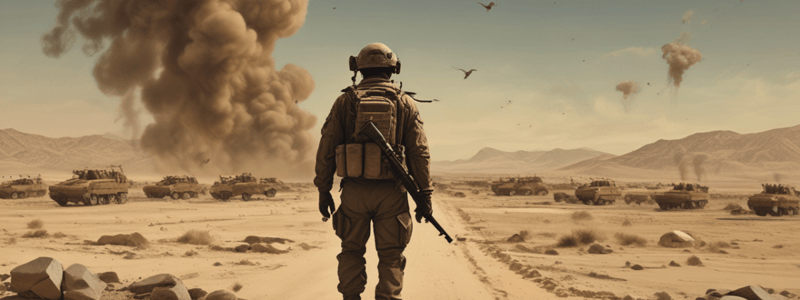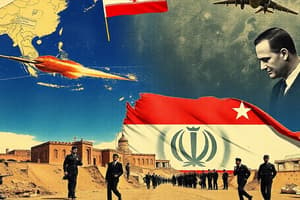Podcast
Questions and Answers
What was the response of the international community to the use of chemical weapons during the Iran-Iraq War?
What was the response of the international community to the use of chemical weapons during the Iran-Iraq War?
- Limited condemnation and no action (correct)
- Immediate condemnation and economic sanctions
- No response due to lack of evidence
- United Nations imposed strict sanctions on both countries
What was the outcome of Iran's CW program?
What was the outcome of Iran's CW program?
- Iran decided to acquire CW but ended its program after the cease-fire (correct)
- Iran developed and used CW against Iraq
- Iran never developed CW
- Iran used CW against its own population
What was the purpose of CW use during the Anfal campaign?
What was the purpose of CW use during the Anfal campaign?
- For internal threats, such as Kurdish civilians (correct)
- To respond to Iraqi attacks
- To attack Iranian troops
- To counter Kurdish rebels
What was suggested about CW agents released by Iraq?
What was suggested about CW agents released by Iraq?
What was the intention of Iran's statement to the UN in 1987?
What was the intention of Iran's statement to the UN in 1987?
What was the topic of discussion for the next week's class?
What was the topic of discussion for the next week's class?
In which year did Japan's CW program reach its peak production?
In which year did Japan's CW program reach its peak production?
Which international agreement did Japan ratify, prohibiting the use of poison weapons in war?
Which international agreement did Japan ratify, prohibiting the use of poison weapons in war?
What was the primary theatre of operations where Japan used chemical weapons from 1937 to 1945?
What was the primary theatre of operations where Japan used chemical weapons from 1937 to 1945?
Why did Japan send scientists and military men to Europe and the US?
Why did Japan send scientists and military men to Europe and the US?
What was the name of the facility that started producing tear and mustard gas in 1929?
What was the name of the facility that started producing tear and mustard gas in 1929?
What was the reason for the intentionally hazy responsibility of approving CW in Japan?
What was the reason for the intentionally hazy responsibility of approving CW in Japan?
What is a key question related to chemical weapons discussed in the course?
What is a key question related to chemical weapons discussed in the course?
What is the stance of the United States regarding the use of chemical weapons, as stated by the President?
What is the stance of the United States regarding the use of chemical weapons, as stated by the President?
What is the collective opinion of civilized nations regarding the use of chemical weapons?
What is the collective opinion of civilized nations regarding the use of chemical weapons?
What is the consequence of using chemical weapons against any member of the United Nations, according to the President?
What is the consequence of using chemical weapons against any member of the United Nations, according to the President?
What is the warning given to the Axis armies and peoples by the President?
What is the warning given to the Axis armies and peoples by the President?
What is the commitment made by the President regarding retaliation in response to the use of chemical weapons?
What is the commitment made by the President regarding retaliation in response to the use of chemical weapons?
What is the President's hope regarding the use of chemical weapons in the future?
What is the President's hope regarding the use of chemical weapons in the future?
What is the primary purpose of the 1925 Geneva Protocol, and how does it address the use of bacteriological methods of warfare?
What is the primary purpose of the 1925 Geneva Protocol, and how does it address the use of bacteriological methods of warfare?
According to LF Haber, what would have 'decided the issue' if World War I had continued, and what was the main reason for this?
According to LF Haber, what would have 'decided the issue' if World War I had continued, and what was the main reason for this?
What was the significance of the reservations added by many states when they joined the 1925 Geneva Protocol?
What was the significance of the reservations added by many states when they joined the 1925 Geneva Protocol?
What was the context of Japan's use of chemical weapons from 1937 to 1945, and what was the primary theatre of operations?
What was the context of Japan's use of chemical weapons from 1937 to 1945, and what was the primary theatre of operations?
What was the limitation of the 1925 Geneva Protocol, and how did it affect its implementation?
What was the limitation of the 1925 Geneva Protocol, and how did it affect its implementation?
What was the significance of the 1925 Geneva Protocol in the context of international efforts to ban chemical weapons, and what did it convey about the global attitude towards chemical warfare?
What was the significance of the 1925 Geneva Protocol in the context of international efforts to ban chemical weapons, and what did it convey about the global attitude towards chemical warfare?
What was the significance of the 1899 Hague treaty in relation to chemical weapons?
What was the significance of the 1899 Hague treaty in relation to chemical weapons?
What was the notable event in 1997 related to chemical weapons?
What was the notable event in 1997 related to chemical weapons?
Which incident in 2002 highlighted the use of a chemical weapon in a hostage situation?
Which incident in 2002 highlighted the use of a chemical weapon in a hostage situation?
What is the name of the nerve agent used in the assassination of Kim Jong-nam in 2018?
What is the name of the nerve agent used in the assassination of Kim Jong-nam in 2018?
What were the chemical weapons used by the Assad regime and IS in the Syrian Civil War?
What were the chemical weapons used by the Assad regime and IS in the Syrian Civil War?
What was the significance of the 2018 Salisbury incident in relation to chemical weapons?
What was the significance of the 2018 Salisbury incident in relation to chemical weapons?
Flashcards are hidden until you start studying
Study Notes
Chemical Weapons Overview
- The 1907 Hague Convention prohibited the use of poison weapons in war.
- Japan ratified the 1907 Hague Convention but did not sign the Geneva Protocol of 1925.
- Japanese scientists and military personnel were sent to Europe and the US to investigate chemical weapons.
- Japan's CW program grew sporadically in the 1920s and 1930s.
Japanese Use of Chemical Weapons
- The Japanese military services used chemical weapons over 2000 times between 1937 and 1945, primarily in the China Theatre of Operations.
- The Number One Chemical Experimental Battalion was sent to China in July 1937, and permission to use CW was given on July 28, 1937.
Factors Influencing Use and Non-Use of Chemical Weapons
- Factors influencing use and non-use of CW include military results, humanitarian results, and response of the international community.
Other Cases of Chemical Weapon Use
- Yugoslav forces used tear gas in 1991, and there were reports of CW use during the Bosnia war (1994-5).
- Russian forces allegedly used CW in Chechnya (1994-95), and there were reports of CW use by Russian forces in Chechnya.
- Allegations of CW use were made against Sudan (1999-present), Pakistan (2005-6), and Turkey (2006).
- Chlorine truck bombs were used by Iraqi insurgents in 2007, and CW were used in the Syrian Civil War by the Assad regime and IS.
International Agreements and Protocols
- The 1925 Geneva Protocol prohibited the use of asphyxiating, poisonous or other gases, and of all analogous liquids, materials or devices.
- The protocol extended the prohibition to the use of bacteriological methods of warfare.
- The protocol applied only to those states who ratified it, with many states adding reservations declaring that it would cease to be binding if their enemies, or the allies of their enemies, failed to respect the prohibitions of the protocol.
Studying That Suits You
Use AI to generate personalized quizzes and flashcards to suit your learning preferences.




